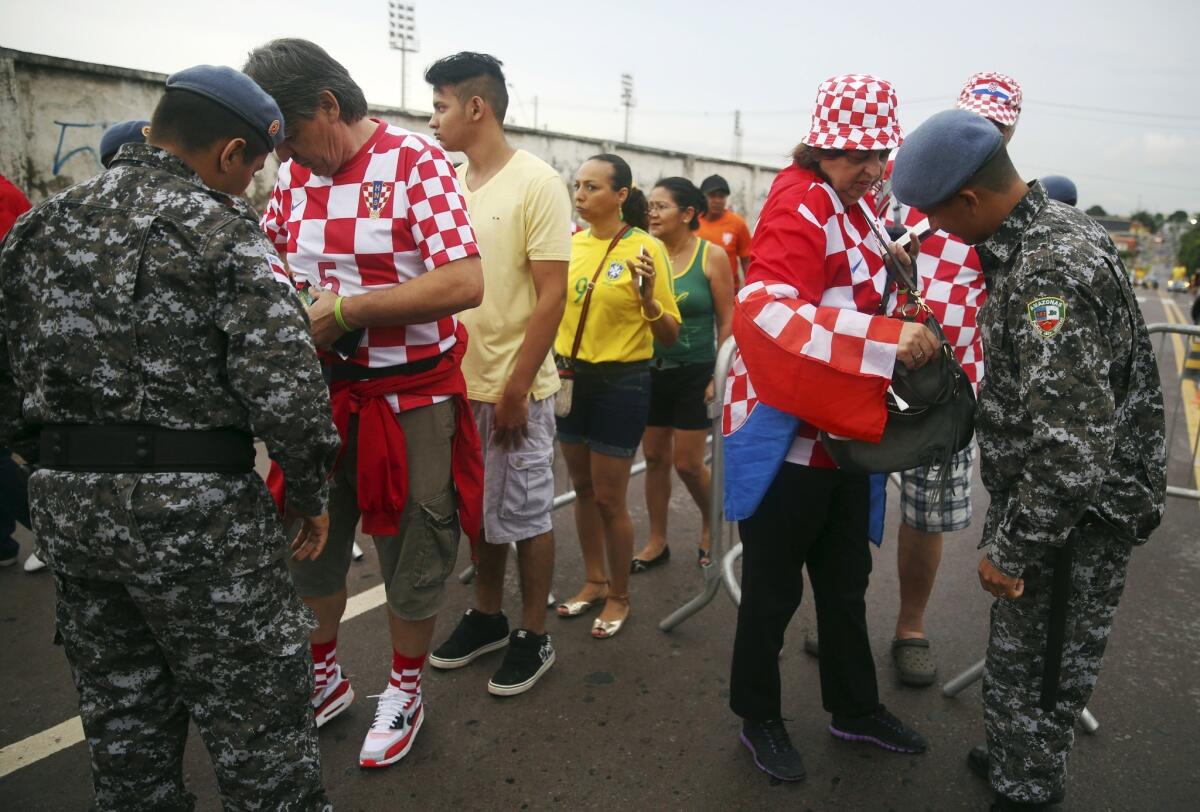Security is high priority, and high profile, for U.S. at World Cup

- Share via
REPORTING FROM SAO PAULO, Brazil — It isn’t hard to figure out when the U.S. World Cup team is heading to practice.
Shortly before its arrival at Sao Paulo FC’s sprawling training center, the U.S. team’s temporary home in Brazil, a group of at least 10 camouflage-clad soldiers carrying shotguns and automatic weapons line both sides of the six-lane Avenida Marques de Sao Vicente.
A helicopter hovers overhead, following the team bus as it negotiates the narrow, traffic-jammed streets between the hotel and the Barra Funda district in the center of the city. State Department personnel roam the grounds, whispering into the tiny wireless devices hidden in their sleeves.
“I’ve been to three men’s World Cups and three women’s World Cups. And it’s not any different than other situations,” U.S. Soccer spokesman Neil Buethe said.
And that’s about all he would say.
“We don’t get into the details of those security measures. For obvious reasons,” he said. “But we’ve taken the proper steps.”
The Brazilian Intelligence Agency was a little more forthcoming, saying it has provided its highest level of protection to seven of the 32 teams in the World Cup, including the U.S. That’s helped make this the most heavily policed World Cup in history, with a security force of 170,000 — almost as large as Britain’s armed forces — having been deployed around the continent-sized country.
And that, like the tournament itself, is proving costly: Brazil is spending an estimated $840 million on security, nearly five times what South Africa spent during the last World Cup four years ago.
The BIA did not name the other six teams singled out for special attention but security has been especially tight around the teams from Brazil, Argentina and England.
The English, who are based in Rio de Janeiro, have been practicing at a military facility, with submarines occasionally surfacing in the channel behind it. When the team arrived in Brazil this month, it was greeted by dozens of regular army soldiers and grim-faced police in full riot gear and carrying protective plastic shields.
Many of the roads near World Cup hotels and stadiums have also been under heavy guard. Before the U.S. team’s first game in Natal earlier this week, pairs of soldiers carrying automatic rifles were positioned at intersections while others kept watch from a bluff overlooking a string of hotels.
That hasn’t necessarily made the games trouble-free. Nearly 100 fans from Spain and Chile easily breached security barriers at Rio de Janeiro’s iconic Maracana Stadium during the first two games played there, although they were quickly rounded up.
But Buethe said U.S. Soccer is confident the security that has been provided for its team is more than adequate.
“We work closely with the State Department’s Bureau of Diplomatic Security and local Brazilian law enforcement to ensure that appropriate measures are put in place for the World Cup,” he said. “We are confident Brazilian authorities are preparing well for the World Cup and will be able handle security challenges.”
More to Read
Go beyond the scoreboard
Get the latest on L.A.'s teams in the daily Sports Report newsletter.
You may occasionally receive promotional content from the Los Angeles Times.







